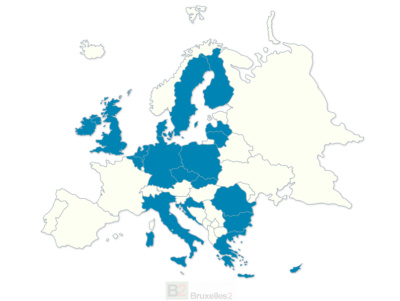Elections 2019. The Conservatives falling in the European Parliament?
(B2) The future European Parliament will be characterized by the fragmentation of political forces, but also by the growth of Eurosceptics. Of these, the European Conservatives and Reformists (ECR) seem to be the only ones trending downward. They could lose at least ten seats and thus move from third to fifth or even sixth group.
A political group on the rise since its creation in 2009
 This Eurosceptic conservative party was founded in 2009 on the initiative of former British Prime Minister David Cameron. It then had 54 MEPs. Since then, the political group has become the third (in size) in the European Parliament, with 77 MEPs, from 19 countries and 26 different political parties. The group grew, just a few weeks ago, with the incorporation of two MPs from the Swedish Democrats, previously attached to the Europe of Freedoms and Direct Democracies group.
This Eurosceptic conservative party was founded in 2009 on the initiative of former British Prime Minister David Cameron. It then had 54 MEPs. Since then, the political group has become the third (in size) in the European Parliament, with 77 MEPs, from 19 countries and 26 different political parties. The group grew, just a few weeks ago, with the incorporation of two MPs from the Swedish Democrats, previously attached to the Europe of Freedoms and Direct Democracies group.
Conservative MPs are anti-immigration, pro-Atlantic and economically liberal.
A Czech as party leader
Although they have very little chance of obtaining the presidency of the European Parliament or of the European Commission, the group has decided to play the game of Spitzenkandidat and elected the Czech deputy Jan Zahradil as the head of the list.
British participation, not so decisive
Today, British MPs are 19, almost a quarter of the group. The participation (or not) of the United Kingdom in the European elections is therefore seen as decisive for the composition of the future group. Their departure would weaken the political group, relegating it to fifth or sixth place. However, their presence will not be sufficient to allow the group to maintain its current position. According to the latest polls, the British Conservatives (Tories) would collapse in the European elections, and would lose seven of their 19 current MPs. These forecasts primarily reflect Theresa May's political failure, but also the general European trend of decline in government parties and the rise of Eurosceptics.
The Polish PiS in a predominant position
The other major party within the political group is the PiS (Law and Justice), the conservative and eurosceptic party in power in Poland. It should also go from 19 to 22 seats in the next Parliament, under the leadership of the number two in the group in Brussels, Jarosław Kaczyński.
The "small" countries maintain their presence
The rest of the group is currently reinforced by around twenty MEPs, from several countries mainly to the east of the Union, whether in the south or the north. We thus find Ireland, Greece, Croatia, Cyprus, Latvia and Lithuania, among the countries where an MP is expected for training. Bulgaria, Czechia, Romania but also the Netherlands, Finland and Sweden would bring two deputies each.
Denmark, Italy and Germany in scattered order
In Denmark, the Dansk Folkeparti is in slight decline. He should get only two deputies, one less than in previous elections. On the Italian side, four to five deputies should participate in the group, mainly from the Fratelli d'Italia party, led by the great-grandson of dictator Benito Mussolini. Besides the Rhine, predictions are difficult. The Alternative for Germany (AfD) party is expected to drop from five to 11 seats. However, his head of the list, Jörg Meuthen, has come very close to Matteo Salvini and could push his compatriots to join the ENL.
Whether in Denmark, Italy or Germany, the permanence of their 18-19 deputies in the group is not certain. Both the EPP and the extreme right have launched their seduction operations.
QWhat about the arrival of new parties?
For now, the group has never had French or Spanish members. That could change. In France, Nicolas Dupont-Aignan and his party (Debout la France), the former partner of Marine Le Pen, announced that they wanted to join this group, presenting it as the only one to have structured eurosceptic proposals. Dutchman Thierry Baudet (Forum for Democracy) did the same. A joint press conference was organized in Paris on February 27 to make the announcement, attended by co-president Ryszard Legutko (PiS, Poland), as well as the Czech Jan Zahradil.
The unknown spanish
In Spain, the unknown is the far-right party VOX. Having just arrived in the institutions, he could obtain six seats and join the ECR. Kosma Zlotowski, treasurer of the group, played the role of godfather of the Spanish party, to introduce it to Brussels, with in particular a press conference during which Santiago Abascal was able to present his program. Zlotowski also accompanied Abascal to visit the fence of Melilla in the midst of the legislative campaign in Andalusia. We have seen it several times in Madrid. However, the Flemish separatists, supporters of Puigdemont, also sit in the group, while Vox has made Catalonia its iron crusade. The most logical thing would therefore be to associate them with the ENF of Matteo Salvini and Marine Le Pen.
An alliance with the extreme right: between possibility and rivalry
An alliance, or even a reorganization, with the more right-wing parties is possible, and even hoped for by some. Marine Le Pen wants to create a European Alliance for Peoples and Nations (AEPN), bringing together the ECR in particular. According to her, neither the Germans of the AfD nor Vox will join the conservatives. The Frenchwoman was confident in an interview with the Belgian newspaper Le Soir. " Perhaps, when the Poles realize that they have no interest in keeping a weaker group than before, they will return to negotiation. The Polish co-president is firmly opposed to it for the moment, openly displaying his ambition to be essential in Brussels after May 26. The group wants to be a natural ally of the EPP to form a majority. At the ideological level, the ENL is considered too protectionist. Last but not least, the refusal to associate with the name of Le Pen, a " toxic mark “, according to a member of the party.
(Leonor Hubaut)
Read also:



ping: The Conservatives falling in the European Parliament? | France Politics
ping: Elections 2019. A place of choice for the far right in the European Parliament - B2 Brussels2
ping: Elections 2019. Objective for the European United Left (GUE), save the furniture - B2 Brussels2
ping: European socialists in search of a life-saving start - B2 Brussels2
ping: Liberals, Democrats, and other 'Renaissance', the pivotal group - B2 Brussels2